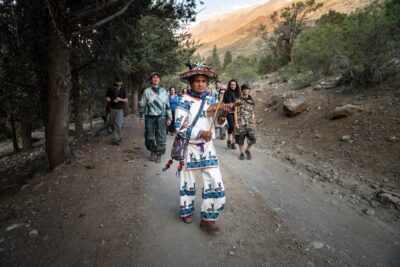
The School of Mountains and Waters
The School of Mountains and Waters draws on the history of drinking water in the city of Amsterdam, its distribution among communities in contrast with current and future political and ecological concerns. Almost a third of The Netherlands is below sea level, the delta in which it is located makes it a low- lying country predisposed to flooding. For centuries the country has been battling with waters. The actual process of sea level rising, as a consequence of capitalocenic climate change, bring forth questions of adaptation, energy transition and social and ecological justice.
This artistic research project is an inquiry on the limitations of thinking the living territory through the notion of nation state, thinking with the help with other forms of thought on the way in which waters are co-produced by the different beings/ bodies that take part in its generative cycle.
The School of Mountains and Waters relates to the territory and the people who inhabit it through various disciplines: indigenous knowledge and practices, history, critical geography, natural and social sciences, (glaciology, geology, anthropology, sociology) and visual and performative arts. The project is proposed as a context in which to rehearse an ecology of forms of knowing.
Initiated by Chilean-Mexican artist- researcher Amanda Piña, The School of Mountains and Waters is framed within a long-term research into the ongoing loss of cultural and biological diversity entitled Endangered Human Movements*, the first part of the project in Amsterdam will be realized with DAS students in the frame of the project Climate imaginaries at sea.
* Endangered Human Movements is the title of a long-term project, started in the year 2014, focusing on human movement practices which have been cultivated for centuries all over the world. Within this frame, a series of performances, workshops, films, installations, talks, publications and a comprehensive online archive are developed, in which ancestral embodied practices -movements, dances and forms of world-making – re-appear in the context of the theatre, the museum and beyond. This re-appearance of ancestral forms of movement entails a movement towards decolonizing contemporary arts and culture by introducing critical perspectives from the fields of anthropology, history, philosophy, visual arts, dance, choreography and contemporary-traditional indigenous Amerindian knowledge, the latter encompassing not only contemporary shamanism but also orally transmitted knowledge, social knowledge about the body, about movement and touch, about healing, about plants, about perception, about the interconnectedness of life forms and about ritual diplomatic knowledge applied to the relationship with other beings.
Research questions The School of Mountains and Waters works with:
Can body base artistic practices generate a different awareness in relation to the urgent situation of imbalance of the systems of earth?
Which practices can contribute to understand bodies of water as something other than H2O?
Would it be possible to think of water from a perspectives of care and ancenstrality?
Could that have agency in the way we know it, in the way that our lives and our geography depend on it?
Through which strategies can we make artworks addressing the issues of territories threaten by the challanges of a well advance climate crisis?
What is an alternative to site specific?
Can we think of the land, the territory as the pedagogy? What do we need to unlearn in order to be able to learn from the territory?
What types of words do we need to use? What sort of narratives can support the topicality of climate justice?
Working methodologies- ways of doing and undoing what we know
We aim to work with methods tested in other iterations of schools situated in different countries where territory and water and its conditions under climate change constituted the focal point to create narratives and images to produce experiences to learn from.
Independent paths of investigation are going to serve us to understand and interact with perspectives from diverse fields of knowledge and practices helping us to sharpen the view on what it means to be part of the challenging realities that exploitation of resources supposes to the present limited existence of live.

Image credits Amanda Piña / nadaproductions 2023

